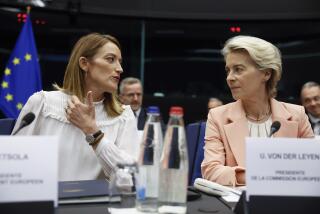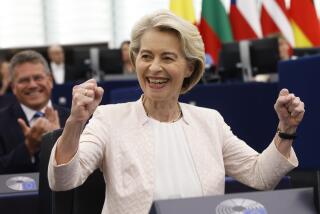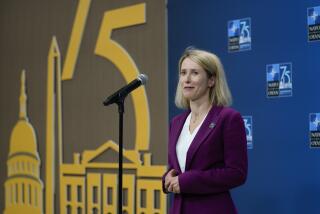Luxembourg’s Ex-Premier Confirmed as EU Leader : Europe: Jacques Santer replaces Jacques Delors as president of powerful Executive Commission.
STRASBOURG, France — In a demonstration of its newly acquired power, the European Parliament on Wednesday formally confirmed Jacques Santer as the new president of the European Union’s powerful Executive Commission.
Santer, former prime minister of Luxembourg, is scheduled to begin work with the commission Monday.
Wednesday’s vote, 416-103 with 59 abstentions, also confirmed Santer’s team of 19 commissioners, who collectively function in roughly the manner of a Cabinet.
The action concluded the first change of commission leadership in a decade, ending the reign of visionary Frenchman Jacques Delors. His tenure in power saw EU member states dismantle age-old barriers dividing them to create a vast single market and commit themselves by treaty to the goals of economic, monetary and political union.
Wednesday’s vote followed a debate and a week of hearings in which Parliament committees exercised their right for the first time to question prospective commissioners. While the hearings resulted in stiff criticism of five candidates, members of Parliament eventually decided to avoid a major confrontation and not use their right of an all-or-nothing veto of the proposed commission.
Under powers granted by the Maastricht Treaty on European political and economic union, the Parliament now has the right only to reject or accept the nominated commission as a whole and not as individuals.
The Parliament’s added powers, which came mainly at German insistence, are aimed at eliminating what has become known as a “democracy deficit” at the European level. The commission’s power, coupled with its perceived lack of accountability, are often cited as important reasons for a growing public alienation from the idea of greater European unity.
Parliament President Klaus Haensch rejected suggestions that members approved the new commission because they were reluctant to use their new powers.
“It’s not that the Parliament didn’t have the courage to say no, it’s that it had the right to say yes,” he said. “This wasn’t about a power struggle between the Parliament and the commission. It was about creating the basis for a parliamentary majority.”
To the extent that the hearings and Wednesday’s confirmation vote were included in the main television newscasts of the EU’s 15 member countries, they constituted an important civics lesson about institutions that, for all their potential power, remain largely remote and mysterious to the majority of Europeans.
While the Executive Commission has the sole right to propose Europe-wide legislation and while the Parliament has gained new importance with the right of veto and a share in decision-making in many areas, the balance of power remains with individual EU states, sitting collectively as a Council of Ministers.
They, for example, nominated Santer and his commissioners, and they have the ultimate say on which commission proposals eventually will become law.
In a speech to the Parliament on Tuesday, Santer indicated that he will press ahead on three major fronts already opened by Delors:
* Building a multibillion-dollar trans-European transportation network that would create thousands of jobs and lash the Continent together.
* Pursuing the creation of a single currency for all member states by the century’s end.
* Forging a common foreign and security policy for member states.
More to Read
Sign up for Essential California
The most important California stories and recommendations in your inbox every morning.
You may occasionally receive promotional content from the Los Angeles Times.










